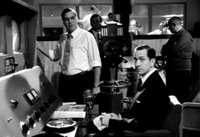Good Night, and Good Luck comes at an interesting time. It's been quite a year for journalism. Many reporters found their courage while covering the Hurricane Katrina aftermath. The White House press corps is showing more teeth toward the Bush administration. And then there's the Judith Miller story.
Of course, this movie was made before those developments took place. Yet the beginning and end of the story, in which Edward R. Murrow scolds his industry while accepting an award, seems particularly resonant, given the current culture. And that was surely the point. Is the movie heavy-handed with that point? Actually, no - not nearly as much as it could've been. But are there really two sides to tell in this story? (Ann Coulter says yes, if you care to read or listen. I don't.) The journalists who saw something wrong and stood up against it, despite opposition from political and corporate factions, are the story.
Is the movie heavy-handed with that point? Actually, no - not nearly as much as it could've been. But are there really two sides to tell in this story? (Ann Coulter says yes, if you care to read or listen. I don't.) The journalists who saw something wrong and stood up against it, despite opposition from political and corporate factions, are the story.
I also thought it was an interesting coincidence that the story is set in motion by reading a report in a newspaper, which was also the case in Capote. It must be the ol' journalism major in me.
The culture of CBS News in the mid-1950's is also a major factor in the movie. Murrow's "serious work" wasn't bringing in money, so to appease his bosses, he had to conduct fluff interviews with celebrities like Liberace. It's in these scenes that David Strathairn might do his best acting. These reporters and producers worked hard, with virtually no support, living and dying with these stories. (And they smoked like chimneys. No wonder most of them died from lung cancer.) But I'm not quite sure how necessary a subplot involving Robert Downey, Jr and Patricia Clarkson was. It provided another example of the oppression of expression that was taking place in that environment, which was interesting (especially with those two actors). But it seemed like a digression to the main story.
Ultimately, what impressed me the most about this movie was that George Clooney preferred to tell a story that meant something to him, rather than go make something like "Ocean's 15." Is that a little bit of my old man-crush on Doug Ross popping up? Maybe, but I don't think so.
I'm glad that he didn't try to tell the complete story. He lets you try to fill in the blanks and form your own opinions. And if you want to learn more, the information is out there. But the movie also makes you wonder how much the world has and hasn't changed since the 1950's. And if you're like me, that could either depress or excite you.
Friday, November 18, 2005
Movie Week -- Good Night, and Good Luck
Posted by
Ian C.
at
1:30 PM
![]()
Labels: media, movies, Robert Downey Jr.
Subscribe to:













